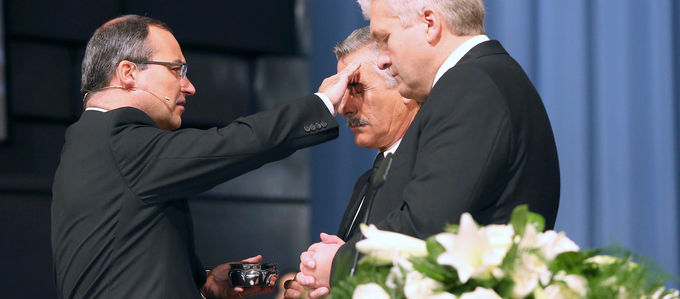
Sacraments can also be of help to the departed. This is not only professed by the New Apostolic faith, but is also taught in the Catholic Church and in Orthodox Christianity. Following is a look at the bigger picture.
They have a permanent place in the calendar of the Catholic community—“Eucharist celebrations with remembrance of the dead”: in some places as often as every week, but at least once each year. These usually involve a general remembrance of the dead, but can also be held for individual persons upon request.
Naturally Catholicism is also familiar with remembrances of the dead without the celebration of Communion, but the mass “with” [Communion] enjoys particular esteem. After all, “as sacrifice, the Eucharist is also offered in reparation for the sins of the living and the dead and to obtain spiritual or temporal benefits from God,” as it says in the Roman Catholic Catechism.
The old Christian tradition
“From the beginning, the Church has honoured the memory of the dead and offered prayers in suffrage for them, above all the Eucharistic sacrifice, so that, thus purified, they may attain the beatific vision of God,” the textbook goes on to say.
In fact: Communion celebrations at the grave have been documented from the second century AD. This practice eventually led to Eucharistic celebrations held on the third, seventh, or ninth and thirtieth or fortieth day after death. General annual commemorations—such as All Souls’ Day —were only added between the ninth and tenth centuries.
A call to remember
Memento—“remember!”—is the name of that part of the general Catholic Communion prayer that likewise involves remembrance of the departed, “who preceded us in the sign of faith and are in faith departed.” The believers ask God to bring the dead to the “place of refreshment, light, and peace.”
This part of the liturgy initially only existed in Rome itself from around 400 AD onward, but spread —along with the practice of naming of the deceased —to the entire Western Church in the fifth century.
Double remembrance
Commemoration of the dead occupies a central place in all Eastern Orthodox Churches. They teach that prayers for the dead can ease the individual’s lot in the afterlife. Special power is attributed to this intercession when it takes place within the “divine liturgy” and in connection with the “bloodless sacrifice”—as in the celebration of the Lord’s Supper.
Thus active commemoration of the dead occurs twice in Orthodox divine service:
- first of all in the central prayer of the Communion celebration (Anaphora) with the alternation between the intercessions of a Deacon and the responses of the congregation (Ectenia).
- and additionally during the preparation (Proskomedia) of the Communion bread (Prosphora): here some pieces of bread (particles) are cut out and grouped around the main portion of bread (the “Holy Lamb”) on a paten (diskos).
Power over hell
The “divine liturgy” takes place once a day in the daily cycle of the different forms of worship. In addition, Saturday is expressly dedicated to the commemoration of the dead in the course of the week. This is a reference to an event known as the Descent of Christ into Hades , which finds its place on the calendar between Good Friday and Easter Sunday. And in the annual cycle, the departed are the focus above all on certain Saturdays before Easter and Pentecost.
In addition to this general remembrance, there are also Communion services for very specific departed individuals. These typically take place on the third, ninth, or fortieth day after their death. Their relatives can donate candles or Communion bread for this purpose.
Christ “has the power to open the gates of hell”—that was how a classic among the Orthodox textbooks put it. And this occurs also “by the prayers of the Church and by the power of the propitiatory Bloodless Sacrifice which is offered for the dead.”
Photo: The church is gathered around its Head-this is symbolised by the pieces of bread on the diskos (plate or paten) at the Orthodox celebration of the Lord’s Supper. In the centre is the “Lamb” (Christ). The virgin Mary is grouped around this on the left, the angels, prophets, martyrs, and saints on the right, and the living and the dead in the foreground. (Taras Ivankiv, stock.adobe.com)













